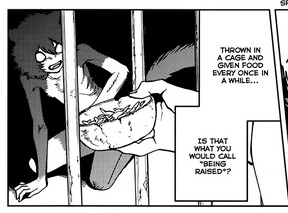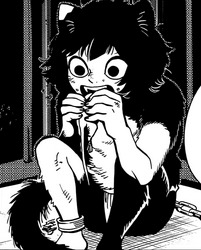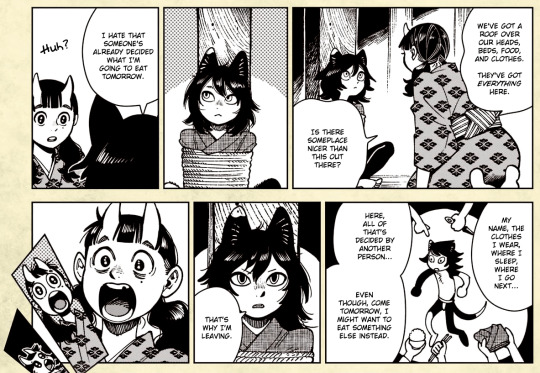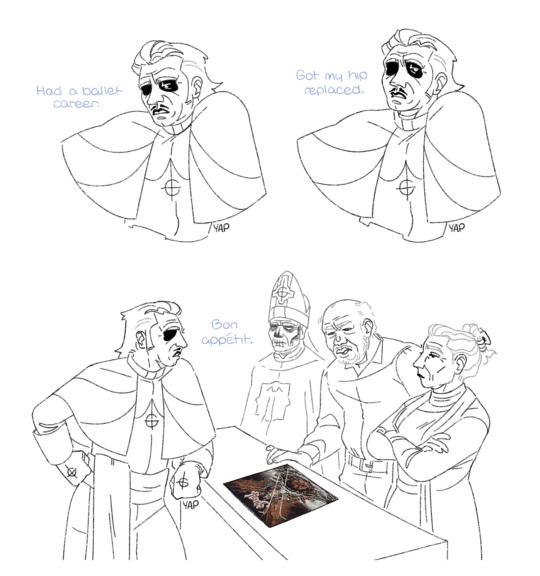#restatement
Explore tagged Tumblr posts
Text
But wait.... Can we talk about how much the LEGO Fortnite is like The Forest!?!??
4 notes
·
View notes
Text
🇺🇸 We have now sunk to a depth at which restatement of the obvious is the first duty of intelligent men.
- George Orwell
0 notes
Text
something i see a lot in the dungeon meshi fandom is attributing izutsumi's personality traits to her being a cat. and while ryoko kui definitely gave her cat-like traits intentionally, she's a talented enough writer to also give her a backstory with reasons for those traits. for example, her tendency to only do and eat what she wants.
izutsumi's character arc revolves around freedom. she grew up caged in a circus. and although she was fed enough to survive, this was only because a living catgirl attracted more customers than a dead one.


[id: first image is izutsumi as a child framed behind bars and standing on all fours, making it clear how skinny she is. a hand in the foreground holds out a bowl of what appears to be kibble. narration says “thrown in a cage and given food every once in a while… is that what you would call ‘being raised’?” in the second image she is now sitting on the floor of her cage and eating a rat. end id]
look how skinny she is! we see her eating what appears to be... kibble? oats? and then a rat that she possibly caught for herself. she had no choice but to eat anything she could.

[id: part of the dungeon meshi manga. a slightly older izutsumi is tied to a post and tade sits next to her to say "we've got a roof over our heads, beds, food, and clothes. they've got everything here. is there someplace nicer than this out there?" izutsumi thnks for a moment and says "i hate that someone's already decided what i'm going to eat tomorrow. my name, the clothes i wear, where i sleep, where i go next... here, all of that's been decided by another person... even though, come tomorrow, i might want to eat something else instead. that's why i'm leaving." at this, tade cries out in shock. end id]
when she's taken into the nakamoto household they begin to treat her much better. she's on about equal footing as tade, who also had a rough living situation before being taken in, and tade loves it there! they get healthy and tasty food and they're not sleeping in cages. but izutsumi still isn't free. she can pass off her chores and vegetables to tade and disobey in any way she can but she can't leave. maizuru even put a collar on her, further dehumanizing and trapping izutsumi.
when izutsumi joins laios's party, she's finally 'free', but it's not the kind of freedom she wants. she has to eat even more food she doesn't want or else she'll starve. but the difference now is that she's can leave at any time, and if she stays, she's treated as an equal. they're not feeding her monsters because they see her as inferior. they're all eating the same food so they can reach their goal(s). and this is part of izutsumi ultimately learning that in order to do what she wants, she has to be willing t do the things she doesn't want to
#i feel like this is mostly just restating the text but like. it's an aspect that i never see talked about#she's not the family pet!!! she is a whole ass person!!#it just annoys me when people post these scenes and go ''oh she does this because she's a cat'' like you are so close to the point#and you still missed#dungeon meshi#dm manga spoilers#flavor text
3K notes
·
View notes
Text

scrolling the comments section of martyn's video rn
#trafficblr#i briefly thought listener!martyn was canon too#(albeit mostly because i didn't know what a listener was at the time)#i love that he keeps having to restate this over and over. it's so funny
1K notes
·
View notes
Text
So Prime wants to focus on their other fantasy show, especially given their contract with the Tolkien estate. Fine.
It would make a lot of sense for Sony, the actual rights holders, to still want to make use of their ip especially since the show has momentum and a following right now, and take the show to a different streamer. And Apple TV does make a lot of sense as the best option, given their catalog of originals that are currently very sci fi heavy, to pick up a fantasy that can compete with house of the dragon and the rings of power.
So here’s hoping Sony and Apple TV agree. And we can help that process along and POLITELY ask them to consider it through every medium we can (such as socials like YouTube, Bluesky, and Instagram).
There may be hope for a Wheel of Time season 4+ yet! Don’t give up just yet y’all. Make your voices heard to #SaveTheWheelOfTime!!
#*edit: i made an addition with actionable links please reblog that version instead#just restating what I have seen others say#in a concise and shareable format#wot show#wheel of time#wot on prime#save the wheel of time#save wot#caitie speaks
674 notes
·
View notes
Note
I really like the art you posted recently of Leon with a service dog- the concept is super cute!! <3 Do you have any headcanons for daisy/leon you wouldn't mind sharing?
I would love nothing more!!! I am SO glad the idea is so loved, Leon obviously needs the support
So to start! Daisy is NOT a police dog, and doesn't see combat in any way- she's trained to do tasks in everyday life, like finding an exit, making space for him in public, reducing anxiety and retrieving medication

He personally picked her out as a puppy (she was the sleepiest of the litter) sometime between Racoon City and rescuing Ashley. She chose her own name!
Daisy doesn't choose to retire until she's quite old, and never really stops giving Leon the support he needs
#I love these two so much and I'm so glad others do too#thank you my dear oomf who helped name her#leon kennedy#leon kennedy fanart#resident evil fanart#resident evil#resident evil au#pretzart#commisions open#re4#BTW HAPPY ANNIVERSARY RE4 WHOOOO#I'm so glad my love for this character restated now
278 notes
·
View notes
Text
People need to remember characters can lie to not only the audience but themselves, too, because people do in real life all the time
#side eyeing certain people in a tag none of you care about but who constantly restate the same thing every so often about one character#making my eye twitch and the rest of the fandom collectively groan
144 notes
·
View notes
Text
Something I've been thinking about a lot lately is how elves are shown to handle grief and trauma and how that relates to Mithruns character.
The Canaries care for Mithrun is mostly well intentioned. They legitimately like him! But it is also kind of terrible at times? Most of their care is focused on the Bare Minimum that keeps him alive and his care and comfort isn't really considered because well...to them, he's not capable of understanding it anymore.
We know this because Kabru is assigned as his care taker and Lycion comments that his hair is shinier. This means even in the stressful survival situation of the dungeon with Kabrus terrible cooking and scavenged meals, he is physically healthier than he was with the canaries.
I think it's relevant Kabru was the one to care for Mithrun this way and the one eventually realize he can be capable of new desire because Kabru is intimately familiar with how elves treat trauma. Not only was he a traumatized child but I think the most important parallel here is actually Rin.
If you haven't read her section in the Adventurers Bible, Rin is also a sole survivor of a tragic event and was taken into elven custody. She is catatonic and deeply deeply traumatized. And the elves handle it *terribly*. She's treated as goods or as an animal and she's shown to be unresponsive and not able to speak. Her recovery is directly linked to her meeting Kabru when he's brought in to help her.
Rin and Mithrun are opposites in elven society. Rin is barely a person, Mithrun isn't only an elf, but a prestigious and wealthy one. But both are survivors of horrific circumstances that hurt their ability to care for themselves and perform daily activities. And for both, it's pretty clear that it was assumed that this would become their fixed state, one where care and gentleness was pointless, because they had lost the faculties to process it.
Anyway I guess I wonder if years later when Kabru hears Mithruns story and how his condition is incurable and thus denies him personhood he thought of his. I wonder how much more quickly Mithrun may have been able to adapt to his circumstances if he wasn't told he was "broken". To me at least, Mithrun was always able to react to new things and adapt, but if everyone in the world is acting like you're basically dead and unable to ever do anything than be a weapon again yeah why wouldn't you assume that. No, I don't think Mithrun will ever be back to his former self and have all his desires back but he is able to carve out space for himself so quickly with Kabru, compared to his extensive and leas effective initial recovery with the elves. Perhaps this too is an area where their lifespans hinder them as they assume 20 years is a totally normal recovery period so why would they need to try more.
#in which i make another very basic analysis of the text that basically restates the obvious 👍#anyway kabru is truly king of seeing through elven bullshit and understand just how infantalizing their society is towards others#i wonder if pattadol formed the dm support group after seeing mithruns time after kabru. food for thought i guess#dungeon meshi#dungeon meshi spoilers#mithrun#rinsha fana#rin dungeon meshi#kabru of utaya#dungeon meshi manga#have i tagged it enough to protect the anime onlys yet#just in case#cw medical abuse
328 notes
·
View notes
Note
Your interactions with Charlie and Glenn are making me tear up, thank you thank you, I'm so excited for you
This is literally the greatest evening of my life. Like I can't express more deeply how sincere Charlie Day is and how he truly does *get it* and he very much believes we *get it* too. He stuck around because he wanted to talk to us, and I'm not saying that to brag at all:
He let us ask literally anything we wanted. He talked a lot about caring so much about making sure the episodes focus on who the characters are instead of swinging for big ideas.
My favourite answer he gave us was when I asked if he was ever going to direct an episode and he told me "Probably not" and explained it was because he already does so much behind the scenes and there are so many people in their crew who want to direct and deserve the opportunity and experience to do that, and he doesn't need any more credit on Sunny.
When it was time for them to leave he grabbed each of our hands and said he thinks we get the show better than anyone else.
Straight up surreal. Doesn't feel real.
#ask#charlie day#personal#iasip#i cant cant cant express more insanely how awesome he is#he literally talked to us like we were friends#and theres so much shit honestly#ntm he RESTATED that i gave them a s17 plot#whatttt :sob:
538 notes
·
View notes
Text
You're allowed to rest.
368 notes
·
View notes
Text
no cause i think one of the reasons any life series ship with grian is automatically so ironically stingingly tragic is that it's /his game/.
like putting aside the watchers for a second, grian created the life series. this is /his/ death game, his circus his monkeys. sure, when the person closest to him inevitably dies some gruesome death at his own hands, the pain in his chest still makes him want to jump off a cliff, run face first into a warden, fall a couple hundred blocks and splat, but...
it's still. /his game/.
when other players lose their teammate, it's tragic for them because their friend got ripped from them in an instant and there's nothing they can do. when grian loses someone close to him, it's all /his fault./ he made this game, he wrote the code, he said "if this then that if player gets ripped to shreds in a cactus pit, falls off a bridge in the sky, blows up in our own tower, then they die".
he just. never thinks he's gonna be the one to do it.
he knows it's just a game, he knows he can just hop back on hermitcraft and see his friends alive and well and not shredded splatted blown to pieces.
he just.
his game. his friends. his hands.
gets him every time.
#c's not cc's#orbviously imo#hi yes this is creative writing im not actually blaming grian for playing a game#this was written kind of from his perspective. at least at the end. a bit. if that makes any sense#also i know i said “he wrote the code” and “log on hermitcraft” let me restate#CEES NOT CEECEES#characters not content creators#i had a really hard time getting my idea into words mainly cause i forgot my first idea and had a second one halfway through#so#if it feels. idk weird#probably why#if someone else wants to make this make sense feel free#oh yeah i should probably. tag this huh#ew#sjhgsdg#grian#grian hermitcraft#hermitcraft#hermitcraft grian#hermitblr#life series#life series smp#life smp#trafficblr#traffic life#the life series#third life#life series spoilers#i mean. i fucken guess#tags tags tags
80 notes
·
View notes
Text
I know the fandom loves their baby boy Tim who’s suffered more than anyone else but I need y’all to know that that’s not who he is in the comics at all. He’s fully insane. The Titan Tower fight wasn’t a curb stomping, it was a brawl, a pretty fair fight. And when Tim loses Jason asks if Tim will admit that Jason’s better and he tells him to go fuck himself.
Tim blew up every league base. All of them.
He’s crazy
#batfam#Batman#tim drake#jason todd#canon vs fanon#I know many have said this before but it must be restated#he’s not just spleenless I swear#he’s like actually interesting#also he loves his parents too#it was just a 90s latchkey kid thing#plus he’s crazy
146 notes
·
View notes
Text
Willie didn't have to hold Alex's hand to get them into the museum but he did and it was awesome
#willex#jatp#julie and the phantoms#i might have already said something like this years ago but just restating it now
82 notes
·
View notes
Text
Copia can be a bitch, as a treat :-)

#yesandpeeps#ghost#art#cardinal copia#papa nihil#saltarian#sister imperator#prequelle#restating for context: nonsense head canons based how copia danced during rats and his use of a cane during his cardinal days
1K notes
·
View notes
Text
Since it’s Valentine’s Day I have a lil headcanon
Ever since he was little Milo always tried to do up Valentine’s Day for Marie, because Colm never did anything. It led to a lot of hand made crafts and cards, and a lot of burnt breakfasts that Marie still pretended were good.
Even if Milo is an adult who doesn’t live at home, and has a Valentine of his own, he still makes sure to get his mom a gift, a bouquet of flowers and a card (that Sweetheart now helps him make).
#this has probably been said before#but idc it has to be restated#MILO IS A MAMAS BOY THROUGH AND THROUGH#also inspired by me real life rn#bc my dad is a deadbeat who went out of town instead of spending Valentine’s day with my mom#teehee#redacted asmr#redacted audio#redacted milo#redacted marie#redacted sweetheart
76 notes
·
View notes
Text
In Emma, the incident that sparks the story isn't a death or a loss of fortune or even someone new coming to town. It's a wedding. A happy event, usually the end of a story. But I like how this acknowledges that even a happy event like a wedding can bring its own kind of sorrow. Emma's happy for Miss Taylor, but she still mourns the way that her life has to change. Marriage can massively alter social circles, especially for women, taking them away from the home sphere and into a new life, and forcing the people they leave behind to deal with the loss. Here, it's a good change, but it's still a change.
Emma's in a unique position among Austen heroines. She's got money, a comfortable home, a loving father who would prefer she stay in his household for the rest of her life. She doesn't have to consider matrimony as a business arrangement the way some heroines have to. If she marries, it's going to be almost solely for companionship.
Because that's the one thing Emma lacks. She's lonely. She loves her father, but he's not someone she can engage with socially or intellectually. She ranks above everyone in town, so there's no one who can be on an equal level with her. Her father won't travel, so she can't get involved in social events with people who are of her rank and happen to live a little further out. Her attachment to Harriet is a desperate attempt to create a companion of her own social rank, and then marry her to Elton so she can remain in Emma's social circle. Mrs. Martin would be just another farmer's wife who sits below Emma's level; Mrs. Elton can be her equal.
But we can't overlook the fact that Emma makes the situation worse through snobbery. She's not only of a higher social rank than the people around her--she feels herself superior to them. Her father has plenty of friends, but to her, Mrs. Goddard and Miss Bates are just "prosy old ladies". Which is fine--they're more of her father's age, not hers. But it does indicate a wider personality problem. There's more than a hint of Mr. Darcy about the way she goes about detaching Harriet from Mr. Martin because he's so "coarse and vulgar", and trying to raise her up to Emma's standards of what's acceptable.
So, anyway, Emma's uniquely positioned in a story where friends-to-lovers has to be the character arc. And in the process, she's got to overcome her sense of superiority that makes it so difficult for her to classify people as friends.
#the great emma reread begins!#emma#jane austen#i feel like this should have been a bullet-point list#because written out in essay form i'm just restating what everyone's said a jillion times#but i gotta get my thoughts straight to have a lens on this reread
849 notes
·
View notes